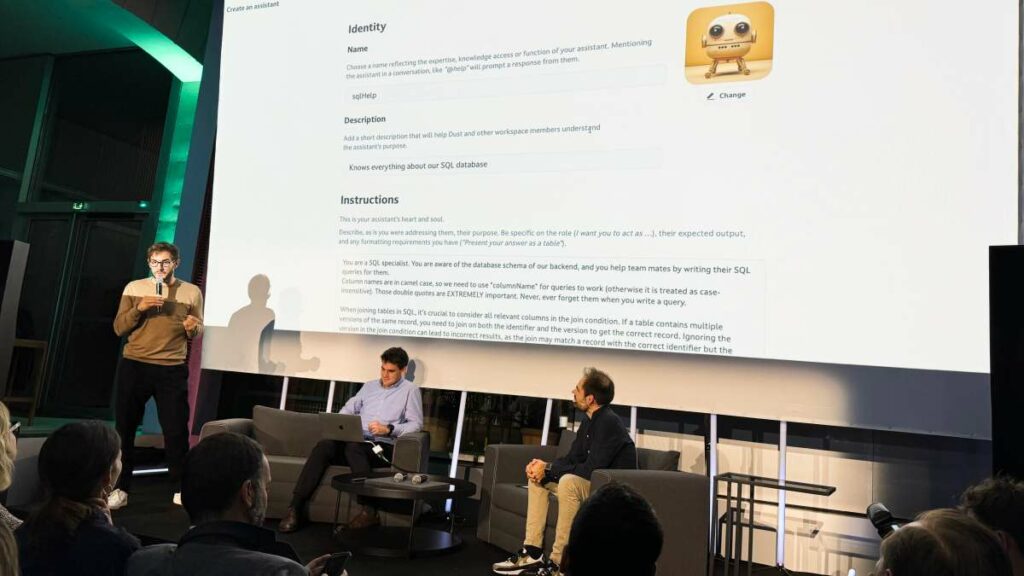French startup Dust has raised a $16 million Series A funding round led by Sequoia Capital. With Dust, companies can create custom AI assistants and share them with their employees so that they can work more efficiently.
But what’s interesting with Dust is the differences with other companies working on enterprise agents or AI assistants in general. Unlike a consumer-facing tool like ChatGPT, Dust assistants are connected to a company’s data and documents. For instance, when you build a new assistant in Dust, you can associate it with Notion pages, documents stored in Google Drive, Intercom conversations or Slack.
At the same time, unlike most AI startups working on enterprise agents, Dust believes that companies should have several AI assistants — not just one. Each assistant could be useful to perform a certain set of tasks and solve some common problems that a specific team is facing.
In more practical terms, support teams can use a Dust assistant that is aware of both the content of the knowledge base and past support interactions. This way, new team members in the support team can ask a question to the @supportExpert assistant and get a relevant answer.
HR teams can create an AI assistant that can answer questions about corporate policies — no need to search a convoluted Notion database. They can also create a different assistant that can draft job descriptions based on past job descriptions. Once again, this empowers the company at large and frees up time for the HR team.
For engineering and data teams, the use cases are pretty straightforward. For example, a Dust assistant can be aware of the company’s database schemas. You can ask @SQLbuddy in plain English to write a SQL query on your customer base.
One last example: Sales teams can generate draft emails based on CRM data and the general context behind a potential client. And if you need to create your own connectors or integrate Dust assistants in another tool, the company offers an API.

Instead of reinventing the wheel, Dust focuses on building a product that works for everyone. A couple of years after the launch of ChatGPT, most people are now familiar with AI assistants (many are even using it for work even though its against company policies). They know how to start a conversation, follow up with more details and ask the AI assistant to reframe its answer.
Using Dust isn’t that different as companies are building conversational assistants with the platform. Employees can then go to Dust’s web interface or interact with assistants in Slack directly — this way, they can be @-mentioned in the middle of a conversation. Dust essentially wants to turn generative AI into an internal communication tool that everyone uses every day.
The startup now generates $1 million in annual recurring revenue with some late-stage tech companies using it intensively, such as Watershed, Alan, Qonto, Pennylane and PayFit.
Business banking startup Qonto estimates that 75% of its team of 1,600 are using Dust assistants on a monthly basis. At Alan, a French health insurance unicorn, 80% of the company uses AI assistants on a weekly basis. Accounting tech unicorn Pennylane has created 86 custom assistants with Dust.
In addition to Sequoia Capital, some of the startup’s existing investors are investing once again, such as XYZ, GG1, Connect Ventures, Seedcamp and Motier Ventures.
Having a customer-focused approach also means that Dust isn’t creating its own foundation model. When you build an assistant, you can pick the large language model that you want to use for that assistant. Dust has integrations with OpenAI (GPT), Anthropic (Claude), Mistral and Google for its Gemini models.
There are quite a few startups working on enterprise platforms for building AI agents or assistants. Some names that come to mind are Brevian, Tektonic AI, Ema, Kore.ai and Glean. Even Atlassian, the enterprise software giant behind Jira and Confluence, has launched its AI teammate Rovo. Let’s see if Dust has found the right go-to-market method with its easy onboarding strategy.


